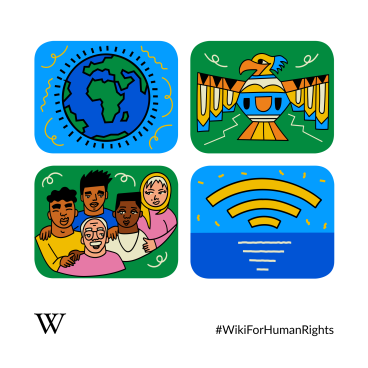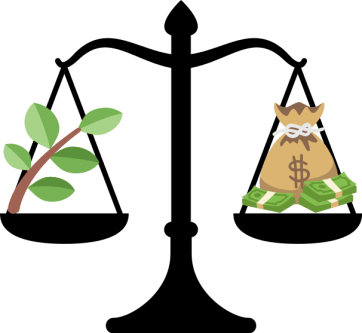In December 2020, the initial plans for the second #WikiForHumanRights campaign, which had its inaugural edition one year earlier in an attempt to commemorate the Human Rights Day by adding content on topics related to human rights, leaked from a public announcement made to the Wikimedia movement. The new campaign was envisioned to promote the nexus between human rights and climate change under the slogan ‘Right to a healthy environment’. As a result, the campaign supported by the Wikimedia Foundation in collaboration with the UN Human Rights Office (OHCHR) and UN Environment Programme revolved around Earth Day (22 April) and took place in the period from 15 April to 15 May 2021.
Overview of the campaign

This year’s global campaign consisted of a public writing challenge to create and improve articles related to human rights, especially human rights topics related to the right to a healthy environment in the languages of Wikipedias or other Wikimedia projects. In particular, participants were encouraged to write about environmental defenders, legal systems or treaties about human rights and environmental rights, communities advocating for the protection of their environment, health or social consequences of communities denied access to a healthy environment and other articles connected with the right to a healthy environment. The choice of articles was facilitated by a partner-generated list of articles.
The challenge was competitive in nature with a point system being introduced so that participants could assign scores to their contributions, and small prizes were planned for the top three contributors and the next top three contributors in non-UN languages, i.e. languages other than Arabic, Chinese, English, French, Russian and Spanish. In order to attract new users from different parts of the world to take part in the campaign, four one-hour newcomers’ workshops — two in English and one in Arabic and French each — were held online on 16 April.
Apart from the writing challenge in the global campaign, communities had the freedom to join with their own ideas and set a slightly different time frame that goes beyond the original run. Some of them mimicked the global campaign challenge with different rules locally, while others worked on defining specific subtopics to better target content gaps. For instance, the Moroccan community organised a writing contest running from 18 March until 31 May and introduced a new list of suggested articles with topics on human rights in Morocco, whereas the Serbian community identified content gaps on environmental protection and targetted this thematic area through a weekly online edit-a-thon in the period 19–25 April.
#WikiForHumanRights on the Macedonian Wikipedia
The community of the Macedonian Wikipedia community joined this year’s #WikiForHumanRights campaign following the success and discovered potential during the inaugural edition. Activities were planned in accordance with the goals of the global campaign and the safety protocols in place because of the effects of the COVID-19 pandemic. The localised campaign consisted of seven events, with two taking place before the original run of the global campaign and five scheduled during that period. These events are briefly explained in turn.

- An online edit-a-thon covering the topic ‘Human rights’ took place on 4 February in collaboration with the Network for European Citizenship and Identity, a non-profit and non-governmental organisation working with people who aim to reduce discrimination and marginalisation.
- An online edit-a-thon on the topic ‘Children’s rights’ was held on 14 April in collaboration with the The first children’s embassy in the World – Megjashi, a non-profit and non-governmental organisation promoting and protecting children’s rights as well as providing support for child victims of violence and abuse.
- Three editing weekends on ‘Natural environment’, ‘Environmental law’ and ‘Climate change’ were held on the weekends of 17–18 April, 24–25 April and 1–2 May, respectively. The choice of topics was deliberately made to cover thematic areas with relatively poor coverage.
- On the Earth Day (22 April), the community was engaged in an editing day on the geological periods of Earth’s history.
- An editing week on the topic ‘Activism for a healthy environment’ was organised in the period 3–9 May. The event was a kind of a writing contest in which only articles on topics from the partner-generated list, the Women in Climate Change list and the Goldman Environmental Prize recipients list were accepted. The top two contributors were awarded small prizes.
In sum, a total of 11 participants, including 6 first-time and 5 female editors, created or improved 118 articles and created 6 new templates.

Can you help us translate this article?
In order for this article to reach as many people as possible we would like your help. Can you translate this article to get the message out?
Start translation